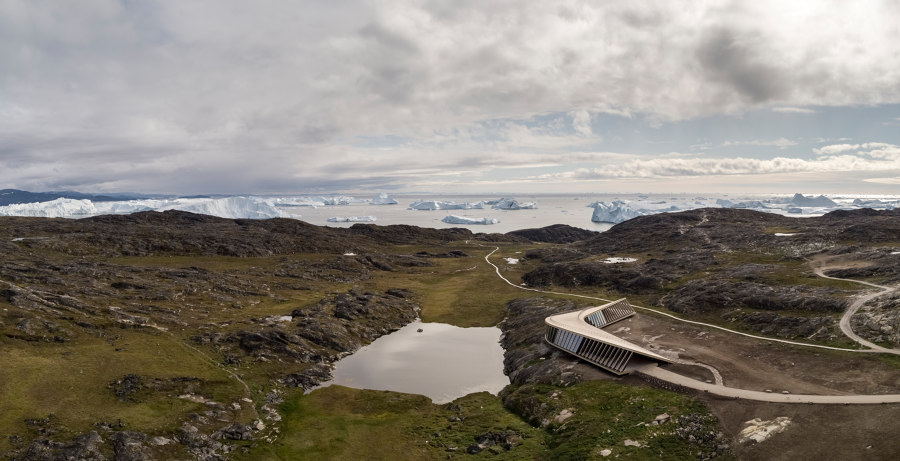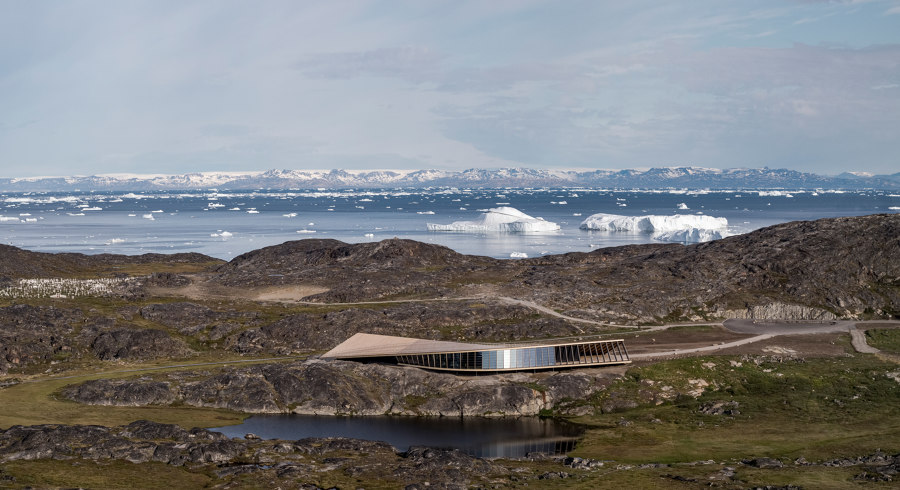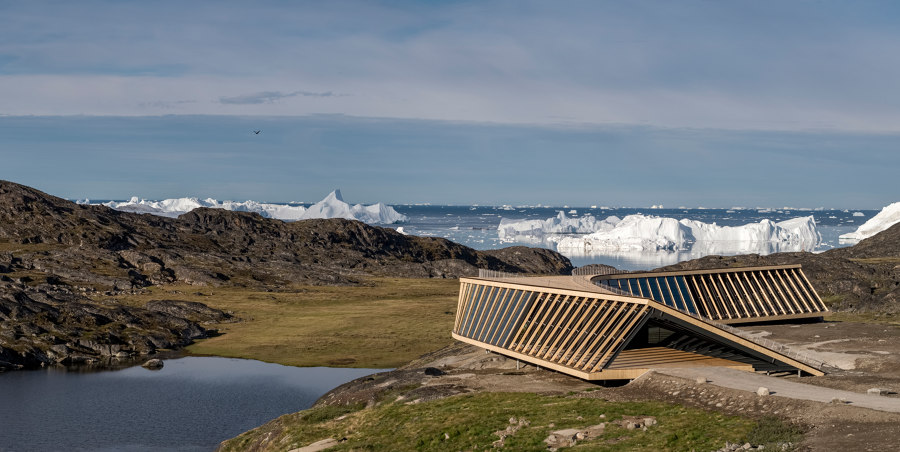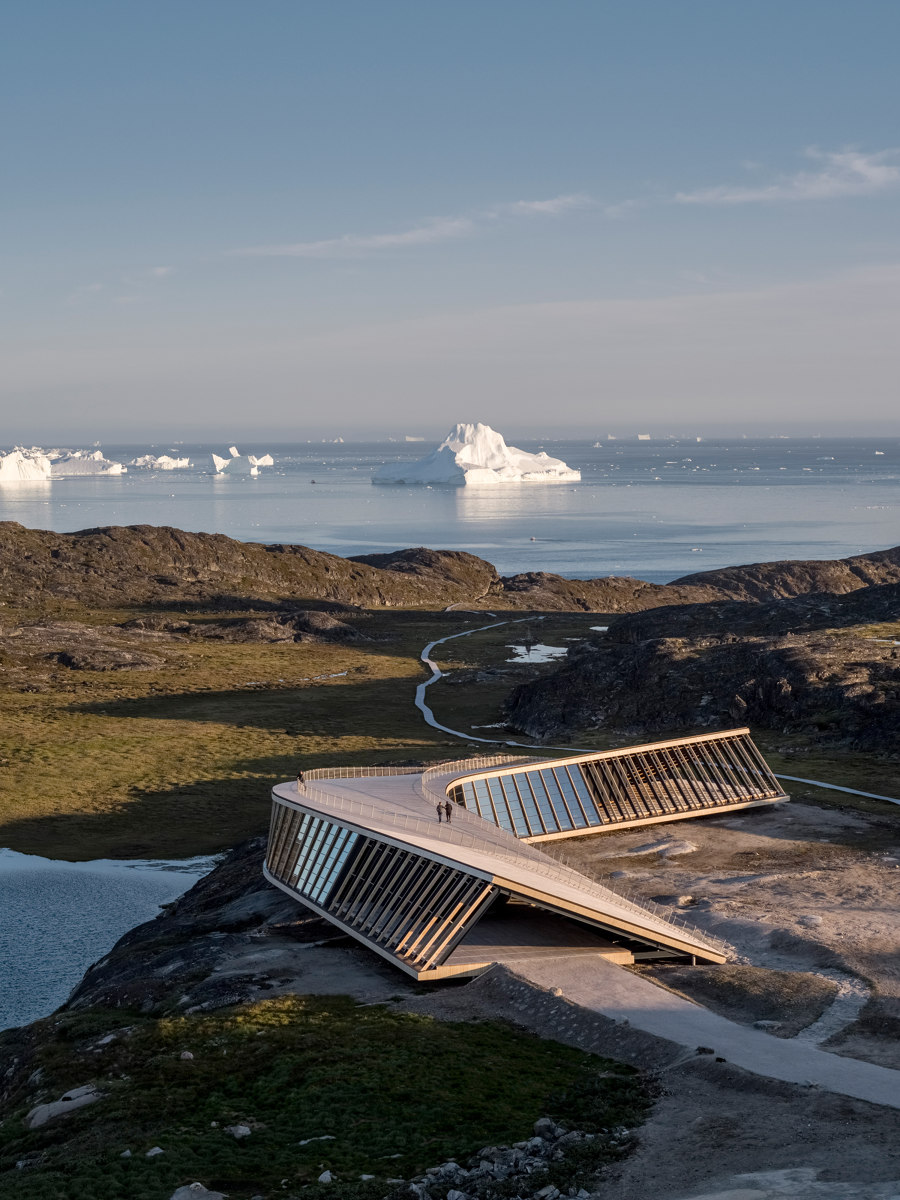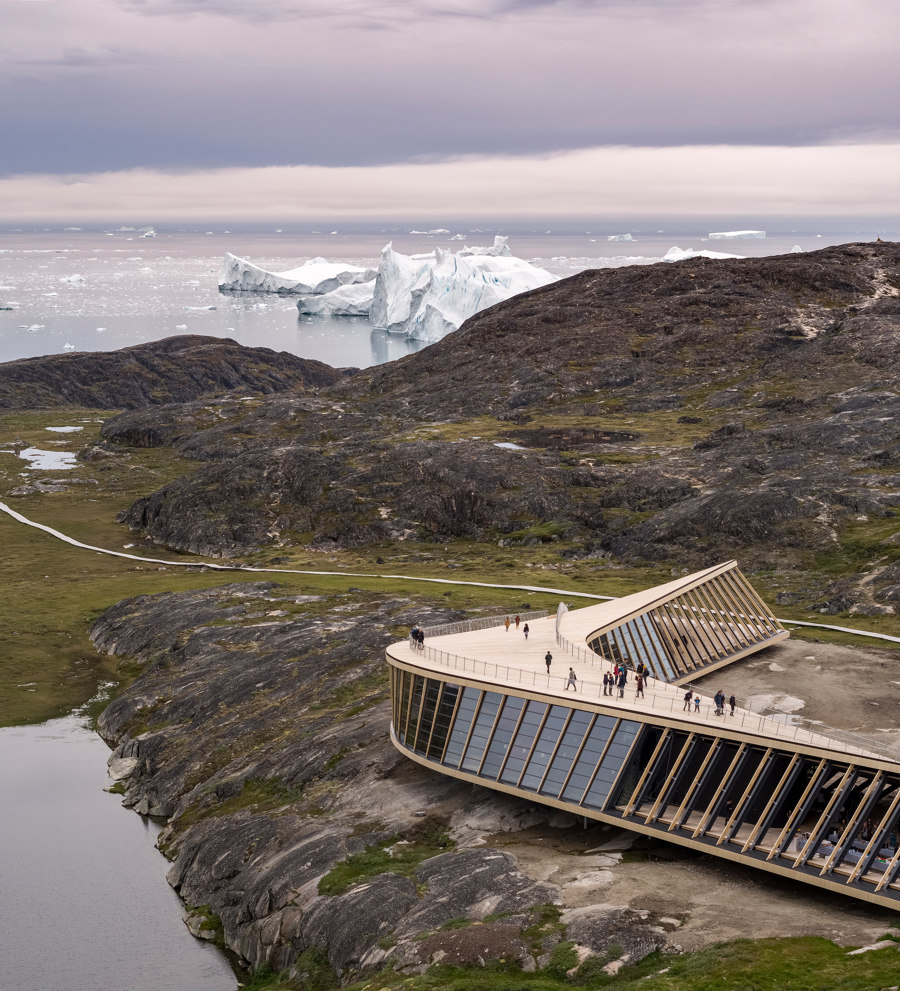In the harsh yet beautiful Arctic landscape surrounded by snow and ice, Dorte Mandrup has designed Ilulissat Icefjord Centre, highlighting the effects of climate change, on the edge of the UNESCO-protected Greenland wilderness.
Overlooking the Kangia Icefjord on the west coast of Greenland, 250 km north of the Arctic Circle, the building blends effortlessly into the landscape and offers a unique vantage point from which to experience the astonishing Icefjord and understand the dramatic consequences of climate change on this remarkable landscape.
Described by founder and creative director, Dorte Mandrup as “a snowy owl’s flight through the landscape", the aerodynamic, light structure of the building appears to levitate over the magnificent, rugged terrain - like an outstretched wing gently touching the bedrock. The shape frames the views towards the fjord while preventing snow build-up and creating a shelter from the snow and freezing winds.
"The Icefjord Centre offers a refuge in the dramatic landscape and aims to become a natural gathering point from which you can experience the infinite, non-human scale of the Arctic wilderness, the transition between darkness and light, the midnight sun, and the Northern lights dancing across the sky," says Dorte Mandrup.
Designed as a year-round visitor centre and meeting place for local residents, companies, politicians, climate researchers and tourists, the centre will house exhibitions, a film theatre, a café and shop as well as research and educational facilities. It tells the story of ice, of humankind and evolution on both a local and global scale and relates to the history of time – sitting lightly on the Greenlandic bedrock – which is the oldest in the world.
Shaped by extreme conditions
The unique arctic surroundings, outline the design of the Icefjord Centre. The complex structure of the building consists of 50 skeletal steel frames, creating a boomerang shape - almost resembling the remains of an animal lying on the rocky terrain. This aerodynamic shape prevents the build-up of snow, enabling the wind to swipe snow away from the facade. In the spring, when the snow melts, the melting water follows its original path underneath the building into the Sermermiut Lake.
The roof provides a natural extension of the area’s hiking routes, leading visitors onto one of the best look-out spots to see the massive icebergs in the fjord and the surrounding landscape. It Is created as a public space –a kind of gateway between the town of Ilulissat and the wilderness beyond. It is open to the public and free to access. At each end of the building there are also covered spaces, creating shelter, and gathering places.
When the first glimmer of light hits the horizon in January after six weeks of darkness, the community gathers in this area to celebrate the sun coming up for 40 minutes before leaving again. The hope is that the roof will become the place for this important gathering.
An important factor is that the building is as sustainable as possible. It is mainly constructed around a steel frame with the absolute minimum use of concrete – usually the main contributor to the carbon footprint – which also means the structure is extremely lightweight. The lightness of the structure makes the impact on the ancient bedrock and its fragile flora and fauna minimal.
The Story of Ice
Inside the centre, visitors can learn more about the nature and culture unfolding before their eyes. They can experience the journey of ice from the birth of the ice crystal in Greenland's cold cloud layer, to when it becomes part of the inland ice and finally moves towards the glacier and breaks off in icebergs. Also, how different Inuit cultures lived under these harsh conditions and how climate change manifests itself in the Arctic landscape.
The exhibition, designed by JAC Studios, consists of a landscape of ice flakes where archeological objects and films are exhibited in ice prisms of glass that visitors can move between. The ice prisms are created from ice blocks collected in the Kangia Ice Fjord, 3D scanned, and mouth blown in glass. Central to the exhibition are authentic ice core drillings taken from the ice sheet, they tell the story about our culture and climate from 124.000 years BC to the present.
About the Sermeq Kujalleq Glacier
Sermeq Kujalleq is one of the fastest and most active glaciers in the world. It annually calves over 35 km3 of ice; i.e. 10% of the production of all Greenland calf ice and more than any other glacier outside Antarctica. The combination of a huge ice-sheet and the dramatic sounds of a fast-moving glacial ice-stream calving into the fjord covered by icebergs makes for a dramatic and awe-inspiring natural phenomenon.
An extraordinary feature is that the ice cap will calf and then the icebergs will sail out towards Disko Bay. This is always different: sometimes there is a huge iceberg, sometimes there are smaller ones, and then they will calf again and sail out into Disko Bay as icebergs.
The centre is directly associated with climate change but also focuses on the importance of ice, with ice cores that will be exhibited and allow visitors to read the history of the world. For example, it will be possible to view the effects of the Industrial Revolution in Britain, marked in the ice core by a layer of pollution.
Design team:
Architect: Dorte Mandrup A/S
Landscape: Kristine Jensen. Landscape & Architecture
Engineer: Søren Jensen Rådgivende Ingeniørfirma A/S
Exhibition design: JAC Studios
